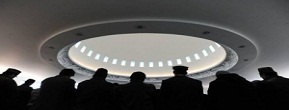British TV Airs Muslim Adhan on Ramadan
 Appealing to the religious minority, the British channel 4 will broadcast the Muslim call to prayer on a daily basis during the holy month of Ramadan, to present a true image for moderate Muslims and challenge those who associate the religion with terrorism.
Appealing to the religious minority, the British channel 4 will broadcast the Muslim call to prayer on a daily basis during the holy month of Ramadan, to present a true image for moderate Muslims and challenge those who associate the religion with terrorism.
“Observing the adhan on Channel 4 will act as a nationwide tannoy system, a deliberate ‘provocation’ to all our viewers in the very real sense of the word,” Ralph Lee, head of factual programming, wrote in the Radio Times and was quoted by The Independent on Tuesday, July 2.
Lee said that the “vast majority of people in Britain” would not be aware of the “mass act of personal sacrifice and worship” about to commence during the Muslim holy month of Ramadan.
By airing the adhan, Channel 4 became the first mainstream British television channel to broadcast the call to prayer (adhan) on a daily basis.
Along with the Muslim call to prayer, the broadcaster will also screen a season of programs around the Muslim period of prayer and fasting, which begins next Tuesday.
The channel’s decision followed a suggestion by senior executives that Ramadan was of greater interest to its viewers than the “blanket coverage” given to the 60th anniversary of the Queen’s Coronation by its rivals.
Lee added that video diaries of British Muslims going about their lives during Ramadan will be a hit with younger viewers.
“No doubt Channel 4 will be criticized for focusing attention on a ‘minority’ religion but that’s what we’re here to do – provide space for the alternative and a voice to the under-represented,” he said.
“And let’s not forget that Islam is one of the few religions that’s flourishing, actually increasing in the UK. Like Channel 4’s target audience, its followers are young. It’s recently been reported that half of British Muslims are under 25.”
“Nearly five per cent of the country will actively engage in Ramadan this month – can we say the same of other national events that have received blanket coverage on television such as the Queen’s coronation anniversary?”
Ramadan is the holiest month in Islamic calendar.
In Ramadan, adult Muslims, save the sick and those traveling, abstain from food, drink, smoking and sex between dawn and sunset.
Muslims dedicate their time during the holy month to be closer to Allah through prayers, self-restraint and good deeds.
Debated
Channel 4’s pioneering commitment was hailed by the British Muslims.
“This is a very special month for Muslims and its recognition on a mainstream channel is not only symbolic for belonging and solidarity but will hopefully help to portray a more realistic account of Islam and Muslims,” a spokesman of the Muslim Council of Britain (MCB) told The Independent.
Channel 4 said the prayer will be transmitted “directly into British living rooms at the exact time Muslims prepare for their first prayers and as they begin their fast every morning during Ramadan.”
Yet, some secularists saw the move as giving excessive coverage to the Muslim minority during the holy fasting month of Ramadan.
“I wouldn’t object to it as at least it gives some balance to the BBC’s emphasis on Christianity but Channel 4 has to keep it in proportion,” Terry Sanderson, President of the National Secular Society, said.
“The percentage of Muslims in the UK is very small so few people will be interested in it. It may be a novelty and Channel 4 is good at causing a sensation. We don’t want to see any broadcaster becoming a platform for religious proselytizing.”
Lee defended the channel’s decision as correcting a misrepresented image of British Muslims.
“Not surprising when you consider its (Ramadan) near invisibility on mainstream TV. Contrast this with the way most Muslims are represented on television – nearly always appearing in contexts related to extremism or terrorism,” he wrote.
“Even when moderate Muslims do appear, it’s often only to provide a counterpoint to these issues.
“Following the horrific events in Woolwich and subsequent reprisals against British Muslims, there has surely never been a more pressing need to give a voice to the moderate mainstream majority.”
Hostility against British Muslims, estimated at nearly 2.7 million, has been on the rise since the soldier’s killing, which Muslims condemned as running against the basic Islamic teachings.
According to Tell Mama project, which monitors anti-Muslim attacks in Britain, 212 “anti-Muslim incidents” have been reported after the Woolwich attack.
The figure included at least 11 attacks on mosques, in a series manifestation of anti-Muslim sentiments.-http://en.shafaqna.com
Source: On Islam
Add new comment